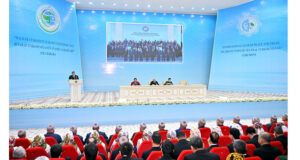Turkmen Scientists Study Emerging Ecosystems Along Caspian Coast
Ashgabat, The Gulf Observer: Researchers from the National Institute of Deserts, Flora and Fauna and the Hazar State Nature Reserve under Turkmenistan’s Ministry of Environmental Protection have completed a joint scientific expedition to the coastal areas of the Caspian Sea, focusing on the newly exposed land resulting from the sea’s retreat.
The fieldwork aimed to identify primary plant communities forming along the coastal territories revealed by the receding waters. Equal attention was devoted to both the Caspian Sea and the Garabogazkol Bay, the latter being shallower and therefore exposing land more rapidly. Scientists collected and processed specialized data to support ongoing research on the transformation of natural complexes in the Caspian region.
These findings will contribute to discussions at the upcoming international scientific conference on the challenges of the Caspian Sea — particularly sea level fluctuations, their causes, and adaptation strategies. The conference is scheduled to be held in Baku in May 2026, in a hybrid format, under the auspices of the Secretariat of the Regional Framework Convention for the Protection of the Marine Environment of the Caspian Sea (Tehran Convention) and the Caspian Sea Hydrometeorology Coordination Committee (CASPCOM).
The event will feature four thematic sections, covering:
- Caspian Sea level fluctuations and paleogeographic–climate research;
- Modeling sea level dynamics — challenges and solutions;
- Impact of sea level changes on aquatic and coastal ecosystems and socioeconomic development;
- Adaptation strategies to water level fluctuations.
The Organizing Committee will facilitate in-person participation by researchers from all Caspian littoral states. Committee members will include national representatives of the Tehran Convention and CASPCOM, alongside experts from environmental ministries. Up to 40 scientific abstracts — ten per section — will be selected by an international review panel for presentation and publication in bilingual conference proceedings (Russian and English).
During their expedition, Turkmen scientists observed a notable spread of salt-tolerant annual plants across hydromorphic zones of the receding seabed. Researchers highlighted this phenomenon as evidence of the reversibility of degradation and desertification processes, illustrating nature’s ability to restore ecological balance and establish new terrestrial ecosystems on former marine terrain.
The results of this study mark an important step toward understanding environmental transformations in the Caspian region and developing effective regional adaptation measures in response to changing sea levels.


